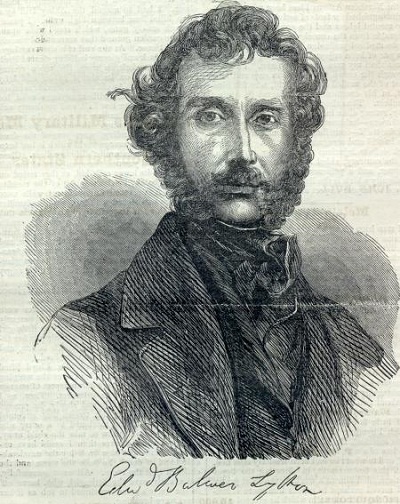Nige pays tribute to the exceptional unreadability of the originator of “It was a dark and stormy night”…
Edward Bulwer-Lytton, born in 1803, was a hugely successful novelist in his day, now all but forgotten and unread, remembered only for incidentals.
He coined the phrases ‘the Great Unwashed’ and ‘the almighty dollar’ as well as the proverbial ‘the pen is mightier than the sword’. He is also the man who persuaded Dickens (a friend) to revise the original ending of Great Expectations, bringing Pip and Estella together in a reader-friendly happy ending – and the originator of the ‘vril’ in Bovril (taken from his science-fiction novel, Vril, The Power Of The Coming Race).
And he came up with the famously ‘bad’ opening line (to a novel called Paul Clifford), ‘It was a dark and stormy night’. Actually there’s nothing wrong with that – it’s only as it painfully unfolds that the sentence reveals Bulwer-Lytton’s limitations as a prose stylist:
It was a dark and stormy night; the rain fell in torrents — except at occasional intervals, when it was checked by a violent gust of wind which swept up the streets (for it is in London that our scene lies), rattling along the housetops, and fiercely agitating the scanty flame of the lamps that struggled against the darkness.
That is bad writing at its baddest.
One of the strangest book finds of my life was of a Bulwer-Lytton. For reasons of research, I needed (or fancied I needed) one of his more obscure titles, Lucretia. This was back in the days before the internet, let alone AbeBooks or Gutenberg, and it proved impossible to track Lucretia down. Then, on a summer walk in rural Suffolk, I was passing a cottage when I noticed that a few tatty old books had been scattered on a small trestle outside, like so many unwanted vegetables, for anyone who cared to take them away. One of these volumes was a sturdily bound, if mouldering, copy of Lucretia. You could have knocked me down with the proverbial.
Naturally I took it away, then made the mistake of trying to read it. Twice I took a run at the opening chapter, but twice I was obliged to pull up halfway through. Bulwer-Lytton’s prose is of such peerless unreadability that the reader feels like one lost in a steamy jungle, hacking away with a machete in the fading hope of stumbling upon a clearing.
And yet this man was one of the top-selling authors of his day. It goes to show how, for the most part, the bestsellers of every age become unreadable to later generations (a heartening thought as one scans the bestseller shelves in W.H. Smith).
Truly, the past is another country; they read differently there.












So who originated the ‘Bo’ of ‘Bovril’?
would it perhaps be related to ‘bovine’, from whence come the hooves from which it’s made?
I wonder if Queen Victoria availed herself, the double-barrelled name may have tempted her, Albert probably would have, him being an early adopter and the left hand barrel sounding a tad Germanic. Bovril contains hooves? blimey, probably horses, considering the current state of the supply industry.
The Victorians had stamina, you had to have firmly been before you were allowed the went card, “let’s went,” as Pancho used to say to Cisco. Today the buggers are gone before they have been, except, sadly, Lord Archer.
He has given his name to two connecting roads in the Clarendon Park area of Leicester: Bulwer Road and Lytton Road.
So Leicester has a Bulwer-Lytton intersection – wonderful.
The Bo in Bovril is surely from the Latin Bos an ox – so it’s Oxo by another name!
There’s another strange pair of roads around there – Avenue Road and Avenue Road Extension.
You can test your ability to tell a Bulwer-Lytton passage from a Dickens one here: http://reverent.org/bulwer-dickens.html.
Was it only yesterday that I, full of blithe confidence (with the bulk of Dickens’ immortal oeuvre (Pip and Pickwick (excellent man!), Drood and Deadlock) under my bibliophilical belt), approached the same, coming away with a chimpanzee-level 6 out of 12 on one hand, but on the other a newfound belief that, after all, there’s much to be said for the lavish and Byzantine wanderings of an unashamedly tortured sentence?
I managed 33%….
….and, upon the result being shown, at once it was as if a dark cloud had descended upon my person, though the day was bright and sky an infinite azure, for it seemed to me that if – as appeared to be the case – I could not tell between the workings of a great craftsman on the one hand, and those of an ordinary or even shoddy amateur on t’other, then either the fault lay with me or, which is worse, with the general apprehension of the greatness of the craftsman himself; yet, even as the dark thought entered my mind, so another part of myself at once banish’d it, for, is it not the case that, to make an argument one may select this portion or that to prove a point – the worst of the great craftsman, the best of the shoddy one – yet, when a fair man makes judgement he takes account of the whole or at least greater part of the work of each craftsman (whether he be a smith of iron or words) and thereupon states, with sounder reason and greater understanding, which is which; and, this thought occuring to me at last, it was as if the dark cloud had lifted and the world before me lay bright and new.
Okay, that’s brilliantly bad.
Indeed Brit – Dickens was not a great one for sentences. Better at paragraph length, pretty strong on chapters, and at book length a clear winner – at least over the likes of Bulwer-Lytton.
To my surprise I got 75pc – was heading for a clear round till No 9 threw me…